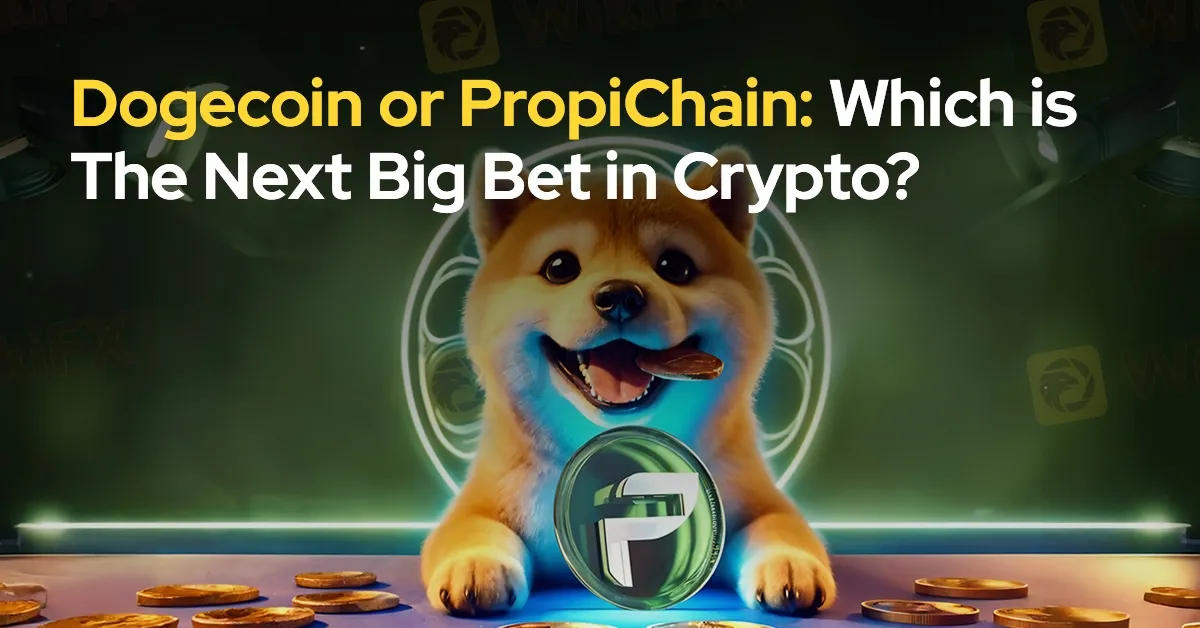简体中文
繁體中文
English
Pусский
日本語
ภาษาไทย
Tiếng Việt
Bahasa Indonesia
Español
हिन्दी
Filippiiniläinen
Français
Deutsch
Português
Türkçe
한국어
العربية
Dogecoin or PropiChain: Which is The Next Big Bet in Crypto?
Abstract:The cryptocurrency market is no stranger to speculation, and recent debates highlight a growing divide among investors. Dogecoin, a staple of the meme coin movement, is making waves with its recent price surge. On the other hand, PropiChain is gaining traction as an innovative blockchain project promising exponential returns. Both coins have their champions, but which one truly deserves attention as the next big opportunity?

The cryptocurrency market is no stranger to speculation, and recent debates highlight a growing divide among investors. Dogecoin, a staple of the meme coin movement, is making waves with its recent price surge. On the other hand, PropiChain is gaining traction as an innovative blockchain project promising exponential returns. Both coins have their champions, but which one truly deserves attention as the next big opportunity?
Dogecoin has recently climbed over 165% in value, now trading at approximately $0.4332. With a 4.71% gain in the past 24 hours alone, its clear that investor interest remains high. The question, however, is whether Dogecoin can realistically reach $2—a milestone that would require not just momentum but transformative market changes. Critics argue that Dogecoin's reliance on its meme status and community-driven hype may not be enough. Without stronger institutional support or practical use cases, is it realistic to expect Dogecoin to break free from the constraints of its inflationary tokenomics? Let us know your thoughts here: https://x.com/WikiFX_Eng/status/1865706276996714693

On the flip side, PropiChain is quietly building its case as a revolutionary force in the cryptocurrency world. Still in its presale phase, this blockchain-based platform is aiming to democratise real estate investment through tokenisation and artificial intelligence. Starting at just $0.004 per token, projections of a leap to $1 by 2025—a potential 10,000x return—have attracted considerable attention. Unlike Dogecoin‘s reliance on market sentiment, PropiChain’s value proposition seems tied to tangible innovation.
The idea of tokenised real estate is nothing new, but PropiChains approach appears fresh. By enabling fractional ownership of high-value properties, it opens doors for investors who may not have had access to this market before. Incorporating artificial intelligence for detailed market analysis and personalised suggestions further strengthens its case. The addition of metaverse features, where users can virtually explore properties, hints at an ambitious vision. But does this vision translate to long-term value? Or is it simply riding the hype of buzzwords like “AI” and “metaverse”?

Dogecoin, meanwhile, remains deeply rooted in its meme coin identity, a strength and a weakness. Its community-driven growth has proven remarkably resilient, but many wonder if its meteoric rise is sustainable. Does Dogecoins appeal stem from genuine potential, or is it just another example of speculative euphoria?
PropiChain, on the other hand, offers a narrative of utility and disruption. But with so many blockchain projects promising revolutionary solutions, how can investors be sure that PropiChain will succeed where others have failed? The real estate market may be vast, but competition and regulatory hurdles could slow PropiChains progress.
Both Dogecoin and PropiChain present intriguing possibilities. Dogecoin thrives on its established presence and community support, while PropiChain tempts with the promise of groundbreaking innovation and staggering potential returns. Neither is without risks, and neither is guaranteed to meet investor expectations.
So, the question remains: should investors place their bets on the familiar popularity of Dogecoin, or should they embrace the calculated gamble of PropiChains uncharted territory? The answer depends on what you value more—hype or innovation, certainty or potential, and above all, short-term gains or long-term vision.

Disclaimer:
The views in this article only represent the author's personal views, and do not constitute investment advice on this platform. This platform does not guarantee the accuracy, completeness and timeliness of the information in the article, and will not be liable for any loss caused by the use of or reliance on the information in the article.
Read more

Malaysia’s Crypto Landscape: Adapting Amidst Global Ambitions
The United States is intensifying its efforts to become a global cryptocurrency hub under President-elect Donald Trump. Experts believe this move could prompt countries, including Malaysia, to reassess their regulatory approaches toward digital assets.

SEC Approves Hashdex and Franklin Crypto ETFs on Nasdaq
The SEC has approved crypto index ETFs by Hashdex and Franklin Templeton, including Bitcoin and Ethereum, marking a milestone in crypto asset investment.

North Korean Hackers Steal $1.3bn in Cryptocurrency in 2024
Over $2.2bn in cryptocurrency stolen in 2024, with North Korean hackers accounting for $1.3bn. Discover how cyber theft impacts the evolving crypto landscape.

ASIC Sues Binance Australia Derivatives for Misclassifying Retail Clients
ASIC accuses Binance Australia of misclassifying 500+ retail clients as wholesale, denying key consumer protections for crypto derivatives. Penalties and reforms are underway.
WikiFX Broker
Latest News
ASIC Sues Binance Australia Derivatives for Misclassifying Retail Clients
Geopolitical Events: What They Are & Their Impact?
Top 10 Trading Indicators Every Forex Trader Should Know
WikiFX Review: Is FxPro Reliable?
Malaysian-Thai Fraud Syndicate Dismantled, Millions in Losses Reported
Trading frauds topped the list of scams in India- Report Reveals
Why Do You Feel Scared During Trade Execution?
Revolut Leads UK Neobanks in the Digital Banking Revolution
Fusion Markets: Safe Choice or Scam to Avoid?
SEC Approves Hashdex and Franklin Crypto ETFs on Nasdaq
Currency Calculator


